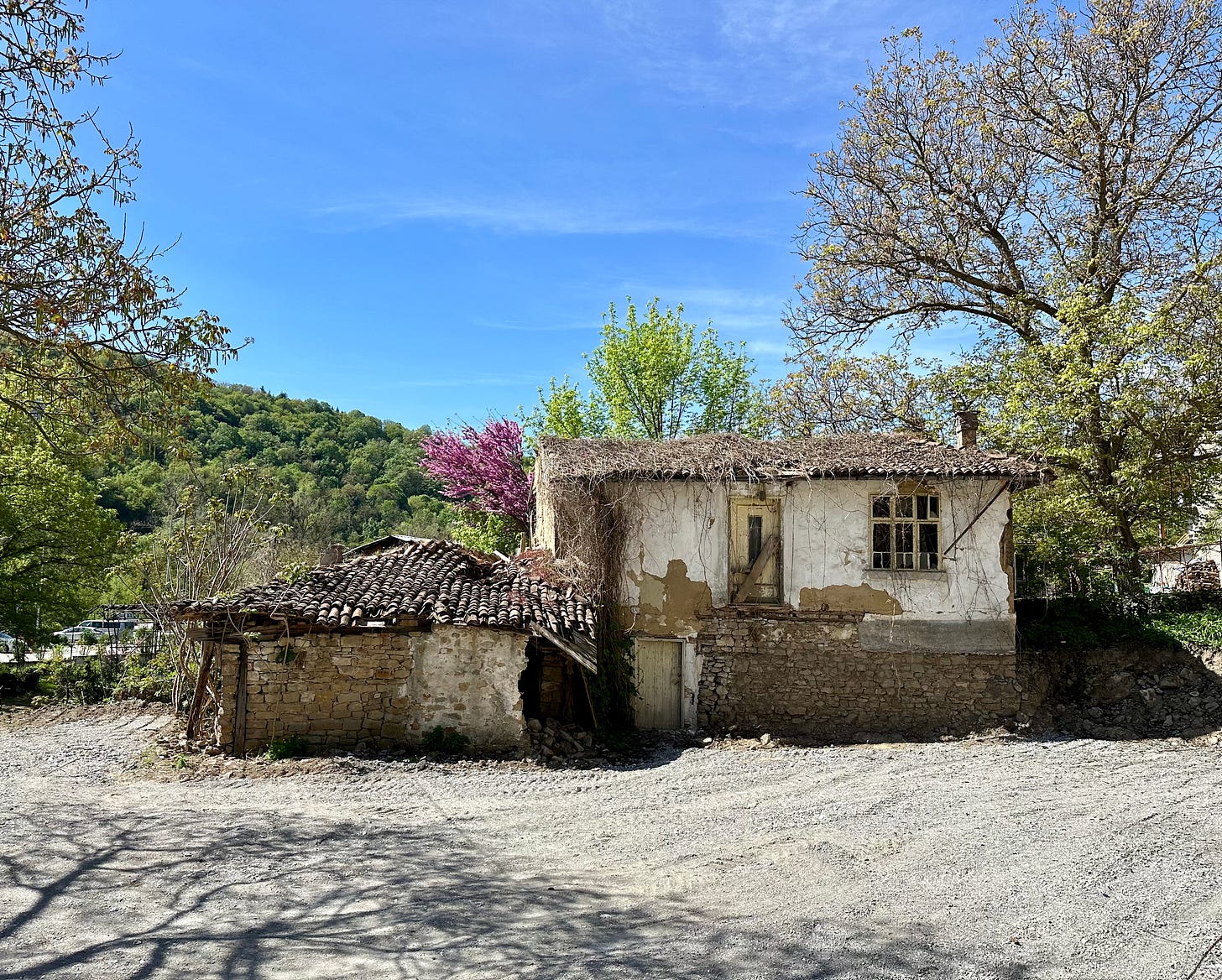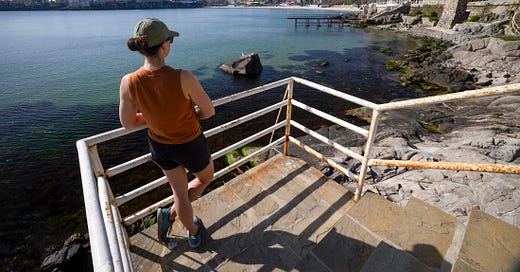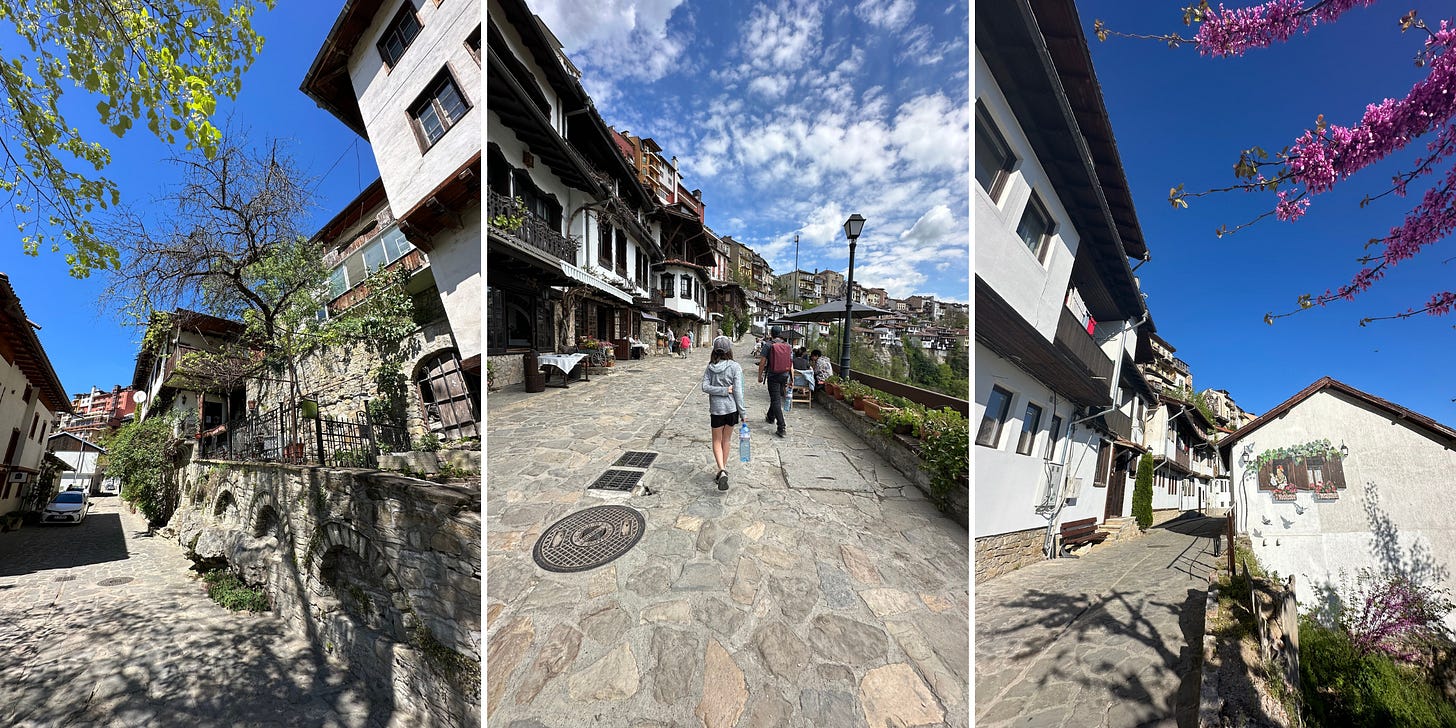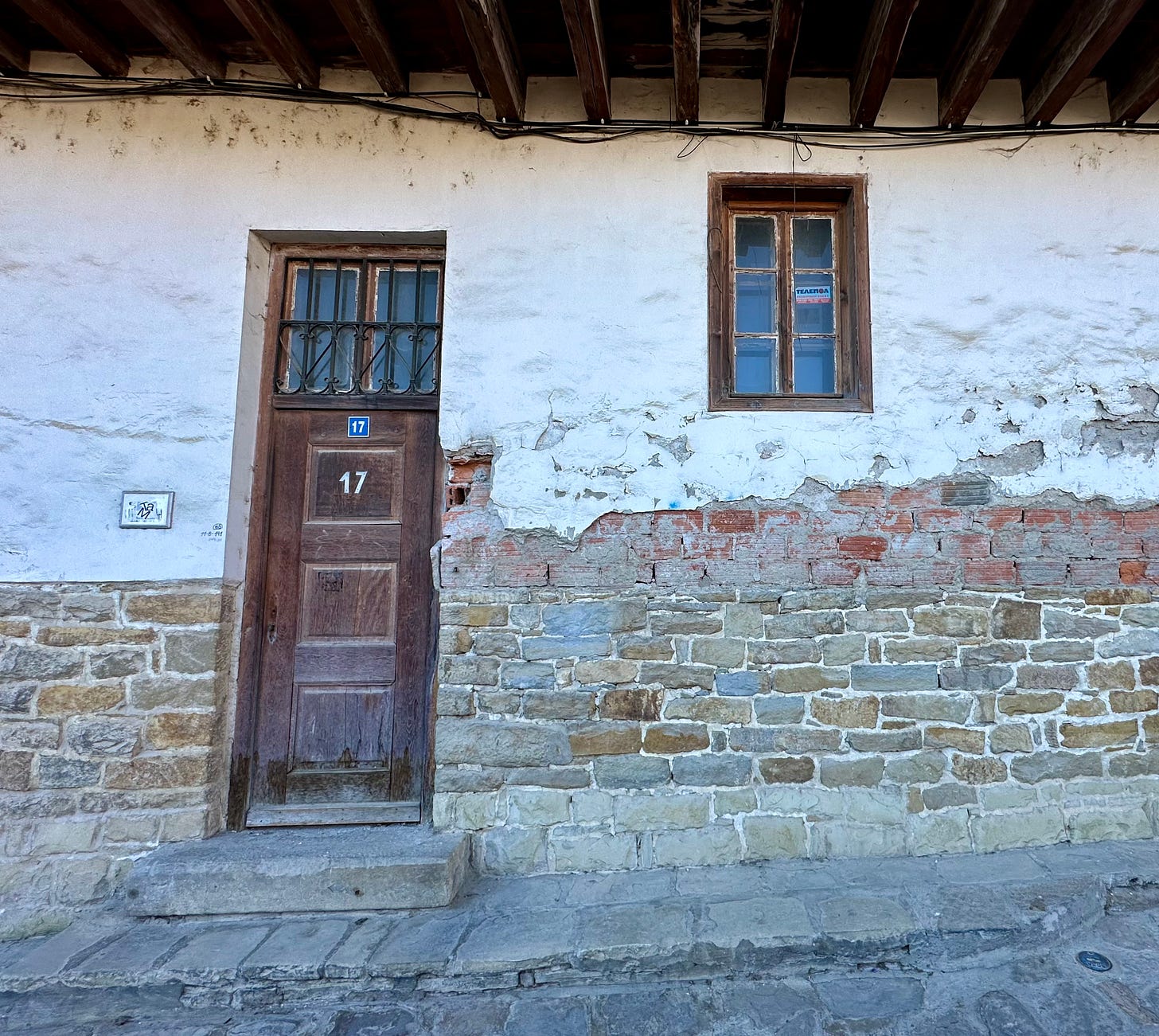We walk the narrow cobblestone laneways, smoothed by millions of footsteps. It’s like a movie set: overhanging window bays, vines crawling up stone walls, Jacarandas exploding with colour, and a mishmash of homes perched along the roadside, some tilting slightly, others looking better kept. This is Ulitsa General Gurko, known as the oldest street in Veliko Tarnovo, Bulgaria. Cars are parked in the strangest of locations and it’s obvious the locals are habituated to maneuvering their way out of them. In my mind’s eye, I try to remove the vehicles and imagine the road many centuries ago — the bustle of activity, people pushing carts full of goods, and perhaps less desirably, the smells.
At home in Canada, I don’t often encounter the layers of history like I do in the stone walls all over Europe.1 In places like Veliko Tarnovo, I’m struck by the realities of what life must have been like for my fellow humans centuries ago.
This region is one of the oldest settlements in Bulgaria. Yet, for all that has transpired here, I can only see a small sampling of how life unfolded for its residents. As we stroll along Ulitsa General Gurko, I glance at a particularly weathered wall. At the bottom, I can see stones laid some 800+ years ago and then various additions and reparations made on top. Each layer tells a story through the ages.
I use Google Translate to read interpretive panels at the fortresses and ruins of Veliko Tarnovo, hoping to glean a sense of what occurred in these spaces. At night I read of the warfare, invasions, rebellions and glory days of the cultures that intersected here. It’s a story so complex I can barely grasp it.
And then I consider whose story is being told. The experiences of everyday people, let alone women and those on the fringes of society, are often left out of the history pages. As I wander past crumbled foundations and peek into nooks and crannies in the quieter alleys, I wonder about those who dwelled — and died — there.
Life was harsh, even for those at the top, who are now commemorated with monuments and immortalized in statues. Those at the bottom must have felt the precariousness and volatility of life pulsing with every heartbeat. We’ll never know these stories. We only come to know those whose names survive through the ages. Even then, we don’t really know them.
The only way to know them would have been to live alongside them.
In Bulgaria, it’s customary to see printed obituaries, called necrologs, posted on doorways, telephone poles, and public notice boards. To a foreigner, they resemble a missing person’s notice. It took some translation for me to understand that it is a family’s way of preserving a loved one’s memory.
As one Bulgarian blogger wrote, “The pervasiveness of necrologs makes for an interesting cultural relationship with death and grieving.” In Canada, obituaries are largely reserved for newspapers and online articles. Death notices are there if we’re looking but they aren’t everywhere. Bulgarians see these every time they go for coffee, for a walk to town, and when they push the door of their home open.
Despite the ubiquitous nature of these notices, however, I pause to ask: How long will family members keep posting notices?

It inevitably leads to the question: What happens when there is no one left to remember us?
I spend my hobby time researching my ancestry and trying to learn the stories of my kin rather than only their names and dates of birth and death. But there is so much I simply can’t know, despite the privilege of having access to various records. Much of it has died with the generations before me. The stories have fizzled out with every passing day.
At some point, people stopped remembering to remember.
The reality, in all of this, is that I am destined for this insignificance, bound to be forgotten by the time my great-grandchildren come into this world.
It’s a sobering thought, but therein lies the significance of what transpires during the time we walk this Earth.
One value of travel for me has been the broadened worldview it offers, both for me and my children. It’s important to me, especially considering that we come from a place of privilege, that we take the opportunity to see a different way of life, nurture empathy, and gain a better understanding of other cultures, with all their complexities. When we remove ourselves from a familiar context, it also teaches us what our own culture values. We see where we might have it wrong back home, what we appreciate, what we miss and don’t miss, and just how conditioned we are by the context we live in.
Travel helps us see how we fit into the big picture in our everyday lives.

Sometimes we can’t see it until we step outside and look in. Right now, as the necrologs remind me, I move into the orbits of particular people — family, friends, strangers — and their experience with me has repercussions. It leaves impressions. When I’m wandering the globe, far away from life as I know it, I land on a truth that can float despite my eventual insignificance: I matter now. That’s what is meaningful.
I matter now, but what I do now also matters.2 Who am I choosing to be for the people around me and those intersecting with me at this moment in history? I’m connected to the future in ways I can’t conceive. My role now is to live in such a way that future generations will thrive. They may not remember me for it, but I will live on in the subtle waves that have emitted from my existence.
My insignificance can be seen as a burden or it can be seen as freedom. I can live with the dread of knowing I’ll be forgotten or I can live my life with the awareness that there is beauty in the impermanence, the fleetingness of it all. We have a constant reminder not to waste any of our damn time, to stop putting things off to one day. I am one of the lucky ones to have a choice of how I live out my days. I’ve never been one for procrastination or ignoring my dreams because they are too scary. Yet, I am constantly asking myself what it means to live a meaningful life.
What it means to leave meaning for others.
After a dinner of kebapche, my family walks through the maze of streets in the Old Town of Veliko Tarnovo. The setting sun paints the world with a golden light that we know will only last a few minutes. We turn a corner and gaze down an alley we have yet to explore. After turning a bend, an exquisite scene reveals itself; a storybook come to life. The St. Constantine and St. Helen Church is bathed in the glow, inviting us down the stairway to catch the last rays of light. My kids scamper down wide-eyed and I am left there to watch them. I watch the fading light as my youngest departs from view.
What will they remember about me? What do I want them to remember about me?
It doesn’t take a stroll through a medieval town to encounter these questions. But in the layers of history set before me, I see more clearly how we’re all connected.
I see the stones laid, the lives lived, and the stories smoothed into the cobblestone we now walk upon.
Ready to dive deeper with me? Upgrade to a paid subscription.
Meghan J. Ward is an outdoor, travel and adventure writer based in Banff, Canada, a Fellow of the Royal Canadian Geographical Society, and the author of Lights to Guide Me Home. Meghan has written several books, as well as produced content for films, anthologies, blogs and some of North America’s top outdoor, fitness and adventure publications.

What’s caught my attention lately… ✨
Esther Perel on New AI - Artificial Intimacy on Unlocking Us. This podcast episode asks: How do we manage social media and new technologies and stay tethered to our humanness? 🤯 “Sometimes, instead of living life, we’re living the experiences of which the value will only come once we’ve posted it.“ Truth.
The inspiration for this post’s title 🎵
A few days ago, after 24 hours of solid transit, we returned home. I put on some music for the drive home and, lo-and-behold, one of my favourite songs came on: “For Now” by Kina Grannis. Have a listen. Her lyrics echoed my thoughts from my time in Bulgaria so beautifully, I wanted to leave some of them here with you:
Sometimes I think about the ones that we've replaced
All the millions underneath the burnt and waste
And I get sad, because of course we'll be the same
All of history collapsing in its wakeMaybe it's enough that I have laid here
Maybe it's enough that I have known inside my head, and
Maybe it's enough to know that we were here together
And that we are the ones
We are the ones
We are the ones for now
Find the rest of her song lyrics here.
Check these out too… 🙌
Lights to Guide Me Home - my memoir (reviews welcome on Amazon and Goodreads)
The Wonders That I Find - my children’s book
My Email Newsletter - updates about my books, projects, and 1:1 coaching
I am an eight-generation Canadian and a descendent of British, Scottish and German settlers living, working, and recreating outdoors in Treaty 7 Territory — the homelands and gathering place for the Niitsitapi from the Blackfoot Confederacy, including the Siksika, Kainai, and Piikani First Nations; the Îyârhe Nakoda of the Chiniki, Bearspaw, and Goodstoney First Nations; the Tsuut’ina First Nation; the Métis Nation of Alberta, Region III and many others. I am doing my utmost, both personally and professionally, to deepen my understanding of the history of Indigenous peoples and the impacts of colonialism — past and present.
I’m referring of course to the history of those who came from abroad and settled on the ancestral lands of Indigenous Peoples. “Canada” is a new nation and our oldest cities date back 300-500 years. Québec City, the only fortified city north of Mexico, offers me a rare experience in Canada - one that transports me back through the centuries. If you’ve never visited, I highly recommend it!
There is an Indigenous philosophy called the Seventh Generation Principle which comes from the Haudenosaunee (Iroquois) that states “The decisions we make today should result in a sustainable world seven generations into the future.” The principle largely refers to our relationship with nature and the importance of ensuring that our Earthly home is sustainable for future generations. Of course, hindsight is 20/20, but what might we learn from the actions of those who came before us and the impact this had on future generations? How might our actions today affect our descendants, seven generations into the future?










A beautiful (self)reflection of your time abroad. Thank you for sharing! I loved Esther Perel’s take on AI. Then again, I’d listen to her recite nursery rhymes I love her so much.
Wonderful! I like to think that sharing my voice—through journals, blogs, whatever “out there” presence I create—will be a share future generations (particularly of mine!) will hear my story. The things I’d love to know about my ancestors, I think maybe in the present I can create that for my future ones.